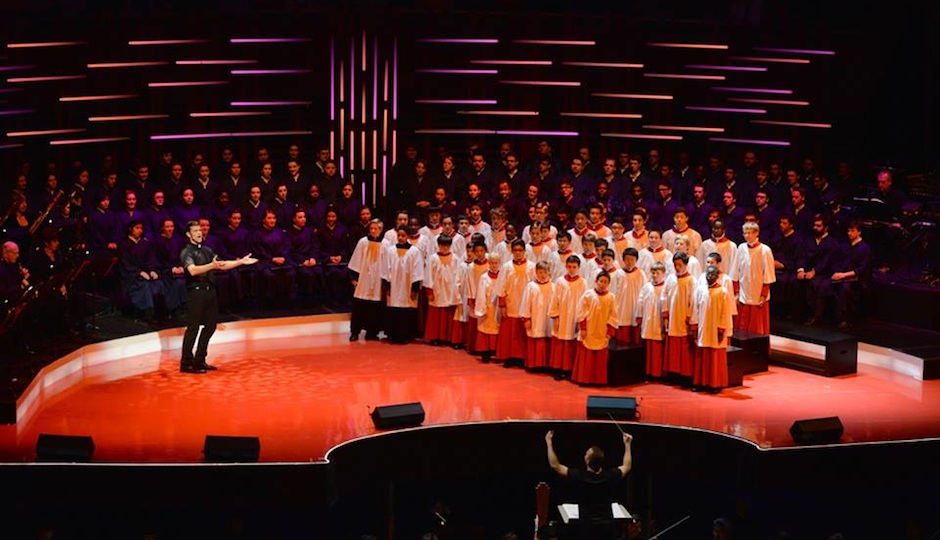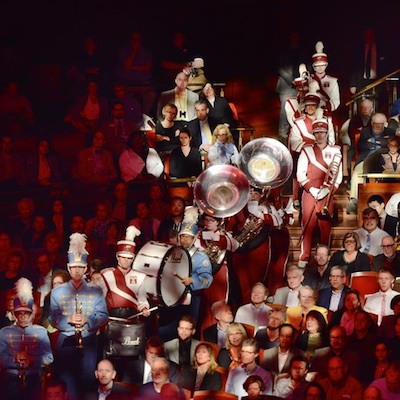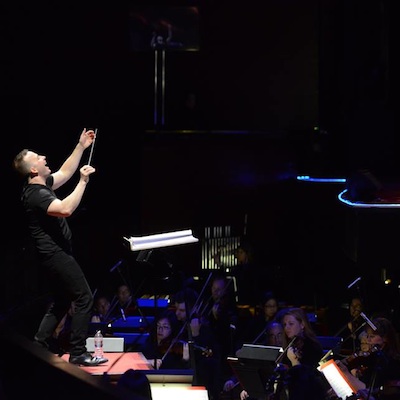REVIEW: Bernstein’s MASS With The Philadelphia Orchestra an Otherworldly Delight

A scene from ‘MASS.’
If you missed The Philadelphia Orchestra’s staging of Leonard Bernstein’s MASS, you didn’t miss a performance: You missed a major, major event.
How else can you describe the Kimmel Center’s Verizon Hall stage filled with not only the Philadelphia Orchestra, but the Westminster Symphonic Choir, the Temple University Concert Choir, The American Boychoir, members of the Rock School for Dance, and the Temple University Diamond Marching Band, plus nearly 20 Broadway actors and opera singers…all at once. Add the excitement of Yannick Nezet-Seguin at the podium, and you sort of wonder how the entire building didn’t shatter due the sheer insane sound and energy from this cast of hundreds (Fun fact: this production is the first time that Verizon Hall’s orchestra pit was used. There were so many people on the stage, they couldn’t fit everyone).

Members of the marching band during ‘MASS.’
It’s also hard to describe the actual performance: It’s part musical theater, part operetta, part immersive theater, part symphony, part experimental music, part jazz, part rock, part spoken word. That’s why Bernstein’s MASS is rarely staged: It not only takes a village, but an utterly talented town, to perform the work. It’s also this mix of styles that has made MASS one of the more contentious works in the modern cannon: Bernstein, who is better known for his scores to West Side Story and On The Town, composed MASS between 1970 and 1971. At its premiere, the FBI had warned the White House that the work might contain “coded anti-war messages,” and a critic from the New York Times called MASS “cheap and vulgar.”
That’s ironic given the work’s central theme of the importance of religious simplicity, which director Kevin Newbury carefully balanced in the staging. The cast of singing actors who make up the Street Chorus were all dressed in simple modern street clothes; The “protagonist,” so to speak, Celebrant, played by Kevin Vortmann, starts off in similar street clothes, but dons elaborate vestments as the musical score continues to expose the breakdown of organized religion. Mr. Vortmann truly was great, as were the other vocal soloists throughout the evening. The Westminster and Temple choirs were superb, handling Bernstein’s score with technical excellence, and the American Boy Choir was excellent throughout, but at the end, when they emerged down the isles of the parquet section and sang with candles, the effect was downright haunting.

Nezet-Seguin conducting ‘MASS.’
And then, of course, there was The Philadelphia Orchestra, which sounded triumphant as usual, even if half of the company was, indeed, underneath the stage. Yannick’s passionate conducting of the challenging piece is an achievement itself, but when one stands back and really examines the evening as a whole, it was a triumph for Philadelphia as a community that embraces the performing arts and a once-in-a-lifetime chance to see this type of work on stage. It’s exciting to think what will come in the future.


